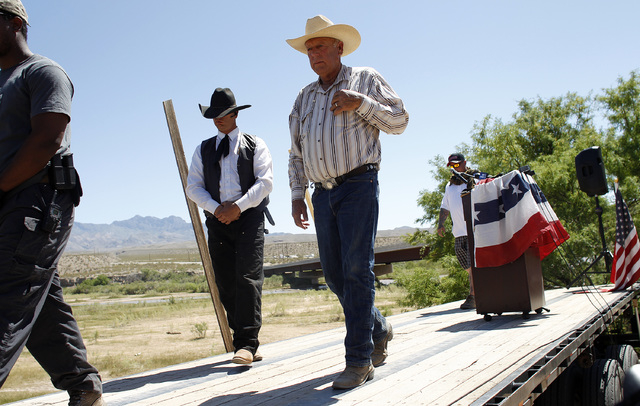RJ fights government secrecy in Bunkerville standoff case

A government proposal to withhold key evidence from the public in the Bunkerville standoff case is “overbroad and unsupported,” according to court papers filed by the Las Vegas Review-Journal on Friday.
“The public’s First Amendment right to observe and understand the investigation in this case deserves greater respect than this proposed protective order provides,” Review-Journal lawyer Maggie McLetchie wrote.
If approved by a federal judge, the government protective order would “impede the rights” of the Review-Journal and other news outlets to cover a case of “local and national importance,” McLetchie said.
The order protects “virtually all documents produced by the government from disclosure” and fails to “articulate good cause for denying the public access to information about this prosecution,” she added.
McLetchie asked U.S. Magistrate Judge Peggy Leen to let the Review-Journal and Battle Born Media, which publishes weekly newspapers in rural Nevada, intervene in the high-profile criminal case and voice their opposition to the government’s secrecy push.
Federal prosecutors have proposed barring defense lawyers from giving copies of critical trial evidence — including sworn search warrant affidavits and government investigative reports — to the public and media. Prosecutors contend the order is needed to protect the safety of witnesses.
“The Review-Journal will aggressively continue its opposition to this proposed order,” Editor Keith Moyer said. “Short of a complete rejection of it, surely a less onerous solution that avoids an absolute disregard for Nevadans’ First Amendment rights can be arranged.”
McLetchie argued in her court papers that the government has offered no proof that any of the witnesses would be endangered if the evidence was made public.
“Perhaps most critically, the government has failed to consider alternatives — such as redacting personal identifying information — which would ensure witness safety without infringing on the public’s First Amendment rights,” McLetchie said.
McLetchie also argued that the government proposal has no guidelines for determining which documents should remain confidential and “no meaningful mechanism” for anyone, including the media, to challenge a document the government deems confidential.
Any protective order signed by a judge should respect the public’s right to learn about the case and “observe the workings of justice,” McLetchie wrote.
The majority of the defense lawyers for the 19 defendants in the case, including Nevada rancher Cliven Bundy, also contend the protective order is too broad and have filed opposition court papers.
Attorney Joel Hansen, who is defending Bundy, argued Friday that the government’s protective order “is nothing but an attempted cover-up — a gross violation of the people’s right to know what is happening in the case by drastically curtailing the freedom of the press.”
He cited a long list of alleged abuses the Bundys and their cattle suffered at the hands of Bureau of Land Management officers and said the family wants to avoid a “star chamber proceeding” as the criminal case heads to trial.
Bundy and 18 other defendants, all of whom are in federal custody, are facing an array of felony charges in the April 12, 2014, Bunkerville confrontation with law enforcement. The armed showdown stemmed from a BLM roundup of Bundy cattle being grazed illegally on federal land.
Contact Jeff German at jgerman@reviewjournal.com or 702-380-8135. Find @JGermanRJ on Twitter.